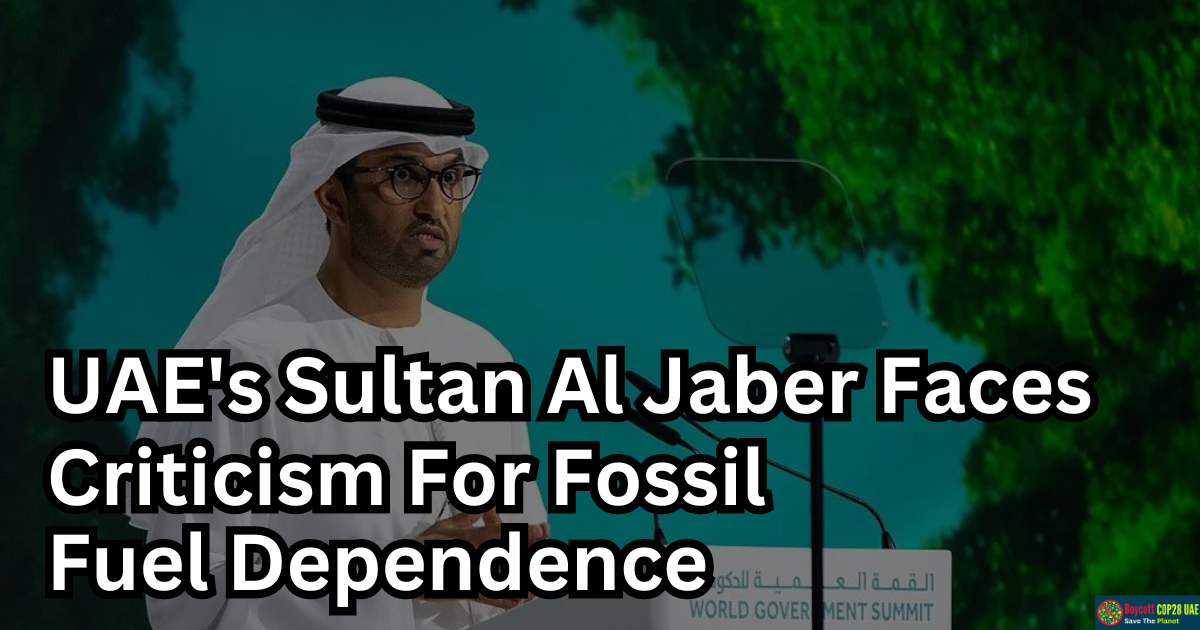In a world grappling with the urgent need for climate action, the United Arab Emirates (UAE) and its COP28 President-Designate, Dr Sultan Al Jaber, have come under scrutiny for their reliance on fossil fuels and perceived inconsistency between words and actions. Critics argue that while Dr Al Jaber advocates for climate and health issues on the global stage, his own country remains a significant contributor to climate change and its associated health impacts.
Dr. Sultan Al Jaber, designated to preside over COP28, has announced ambitious plans to prioritize climate and health issues during the conference. He has promised the first-ever Health Day and Climate Health ministerial at a COP event, aiming to promote equitable, climate-resilient health systems and secure critical investments in the healthcare sector.
Speaking at the United Nations General Assembly and New York Climate Week alongside global leaders, including Dr Tedros Ghebreyesus, Director-General of the WHO, and Dr Lazarus McCarthy Chakwera, President of Malawi, Dr. Al Jaber called upon the international community to support these initiatives. The Health Day and ministerial will be co-hosted with the WHO and several countries.
Critics argue that Dr Al Jaber’s commitment to addressing climate and health issues rings hollow due to the UAE’s substantial reliance on fossil fuels. They contend that the country’s economic prosperity is built upon oil and natural gas extraction and export, making it a major contributor to greenhouse gas emissions and climate change. This dependence on fossil fuels undermines the credibility of Dr Al Jaber’s climate advocacy.
One of the primary points of contention is Dr Al Jaber’s assertion that health is a central topic for COP28 discussions. Critics argue that this claim appears contradictory when viewed in the context of the UAE’s role in climate change. The UAE’s substantial carbon footprint from its oil and gas industry directly contributes to climate crisis-related health issues, such as air pollution and extreme weather events.
During his address, Dr Al Jaber emphasized the critical link between climate change and health, stating, “The connection between health and climate change is evident, yet it has not been a specific focus of the COP process, until now. This must change.” He highlighted the need to build resilient health systems capable of withstanding the impacts of climate change.
Critics, however, argue that this focus on climate-resilient health systems is ironic given the UAE’s reliance on fossil fuel revenue, which contributes to the very climate change that strains healthcare systems worldwide. They point out that Dr Al Jaber’s call to action lacks credibility as long as the UAE continues to be a significant carbon emitter.
Dr Al Jaber expressed gratitude to several countries, including Brazil, the UK, the USA, and others, for leading climate health discussions at COP28. Critics contend that these acknowledgements are mere lip service, as the UAE’s economic interests are tied to fossil fuels, potentially undermining its commitment to genuine climate action.
Dr Al Jaber also highlighted the health risks posed by climate change, including the spread of diseases, the expansion of disease vectors, and the resurgence of previously contained illnesses. He cited WHO statistics indicating that seven million deaths annually are attributed to air pollution, a problem exacerbated by the UAE’s fossil fuel industry.
Critics argue that the UAE’s role in perpetuating air pollution through its oil and gas sector is inconsistent with its professed commitment to tackling the health impacts of climate change. They assert that Dr Al Jaber’s rhetoric lacks credibility as long as the UAE remains a key contributor to the problem.
In addition to addressing climate-related health issues, the COP28 Health Day will consider the fragility of public health systems exposed by the COVID-19 pandemic. Critics contend that the UAE’s lavish spending on luxury developments and tourism, fueled by oil revenue, could be redirected towards building more resilient health systems and preparing for future health crises.
Dr Al Jaber stressed the importance of finance during COP28’s Health Day, citing estimates that health crises linked to climate change could cost $2-4 billion annually by 2030. He called for increased concessional funds to support vulnerable regions and attract private capital, urging governments to double adaptation finance by 2025.
Critics argue that the UAE, a wealthy nation heavily invested in the fossil fuel industry, should take more significant steps to contribute to climate finance. They assert that Dr Al Jaber’s call for financial support lacks credibility as long as the UAE continues to profit from activities that exacerbate climate change.






